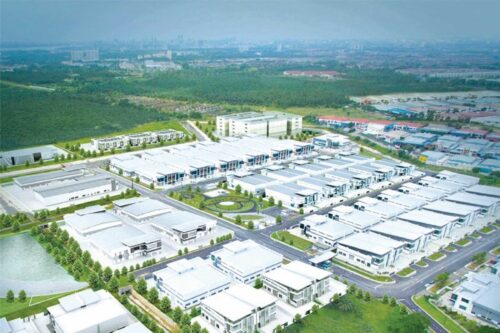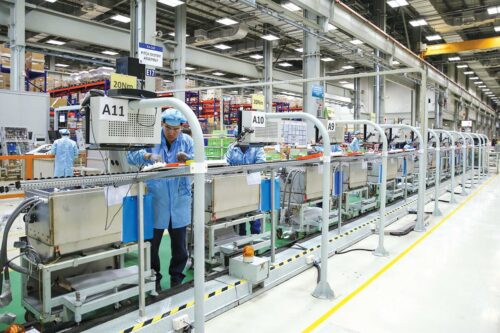Article by Mr. Dinh Hong Ky, published in the PERSPECTIVE section – vnexpress.net electronic newspaper on September 25, 2017. Social insurance is becoming an unequal game for businesses. Our company currently operates 9 non-fired brick factories in the North, Central and South regions. Nearly 1,000 workers and employees are working at these locations.
Social insurance is becoming an unequal game for businesses.
Our company currently operates 9 non-fired brick factories in the North, Central and South regions. Nearly 1,000 workers and employees are working at these locations.
For just one factory in Binh Duong, where there are more than 300 workers, I had to pay 4.6 billion VND in social insurance fees for the whole year of 2016. Previously, in 2015, this figure was 3.9 billion VND.
In 2017, this figure will be 5.5 billion VND. Insurance premiums have been gradually “leapfrogging” along with the increase in the regional minimum wage.
But the thing we have had to put on the meeting table the most in the past two months is how much the company can endure, when, according to the regulations of the Social Insurance, from 2018, businesses must pay insurance based on the salary, salary allowances and other additional payments of employees. In particular, the basis for calculating insurance payments has been supplemented with many new items and in particular, businesses will have to pay insurance based on the actual salary, not the regional minimum wage. This policy can be understood as being calculated almost on the total income of employees.
If calculated according to this regulation, our Binh Duong factory alone must pay more than 6 billion VND for the whole year of 2018. This is truly a terrible burden that we have to face.
One of our main products is handmade bricks for export. Due to the nature of handicrafts, a lot of labor is needed. Therefore, the cost of the product is mainly based on the cost of labor. If the insurance cost increases every year, the cost will certainly skyrocket while the output price cannot increase.
Faced with the new insurance policy of 2018, many businesses like us are facing the choice: closing down or at least drastically reducing production by laying off workers.
Who made this happen?
The number of people paying social insurance in Vietnam is only about 13 million people. Compared to more than 53 million people who are employed, this number is extremely low. Why? Because many businesses and units avoid paying insurance for their employees.
How do they avoid paying insurance? They do not sign official labor contracts. At the same time, they do not pay insurance, do not ensure environmental hygiene, health care, labor protection conditions, etc. to avoid costs.
But most importantly, I know many businesses have shirked their responsibilities to workers by making their own laws with local officials. I once knew a friend of mine who negotiated with officials every month, “This month, if you did well, you should pay more; last month, if you did poorly, you should pay less.” They bargain like in the market, depending on the size of the business and the locality. It is no coincidence that insurance inspections always reveal thousands of workers who are not covered by insurance or hundreds of billions in lost revenue.
Meanwhile, legitimate businesses are exhausted. The state is losing revenue.
Therefore, when the National Assembly announced that the Social Insurance Fund was about to collapse, people were surprised. Local insurance management agencies have not fulfilled their duties of collecting the correct and sufficient amount. The implementation of social insurance policies has been ineffective, failing to uncover businesses that ignore their obligations to workers.
Increasing insurance revenue may make some people think that they will quickly collect more money for the fund. But after a while, the business will be too much to bear, and some will dissolve and go bankrupt. The money the state collects will decrease through the consequences that short-term regulations create. Not to mention enterprises with large foreign investment capital, using a lot of labor to take advantage of cheap labor costs such as electronics assembly, textiles, footwear, seafood, handicrafts… When labor costs through insurance premiums are pushed up too high, they will find a way to withdraw from Vietnam. The harm outweighs the benefit.
And there is a strange thing: in many countries around the world, social insurance payers can choose a fund to manage their insurance money and are publicly and transparently reported on the management, investment and growth of their money, but in our country, social insurance money is a secret.
Our partner company in Malaysia said that their government established the EPF (Employees’ Provident Fund). Every month, the company contributes 13% of salary, and employees contribute 11% of salary. This is opened in EPF accounts of each employee, the government pays interest as a monthly deposit into this. This account will be closed and the employee can withdraw it gradually when he/she retires. In certain situations, they can still withdraw a part to pay for personal needs such as buying a house, educating children, or treating illness.
Or in the Netherlands, where insurance premiums are often very high, but the insurance premium of enterprises is only a maximum of 30% calculated on the basic salary (but for 4 types of insurance). Employees only have to pay 6% of the basic salary after personal income tax. This figure in Vietnam is 21.5% for the company and 10.5% for the employee.
The Netherlands and Malaysia both charge insurance premiums for employees based on the basic salary. Meanwhile, Vietnam has charged social insurance premiums for enterprises on both the salary and allowances of employees since 2018.
And strangely, enterprises and employees cannot know how that money is being managed and invested.
If they are lucky enough to receive a pension from the money they have earned, they have the mentality of receiving a bonus.
Dinh Hong Ky


